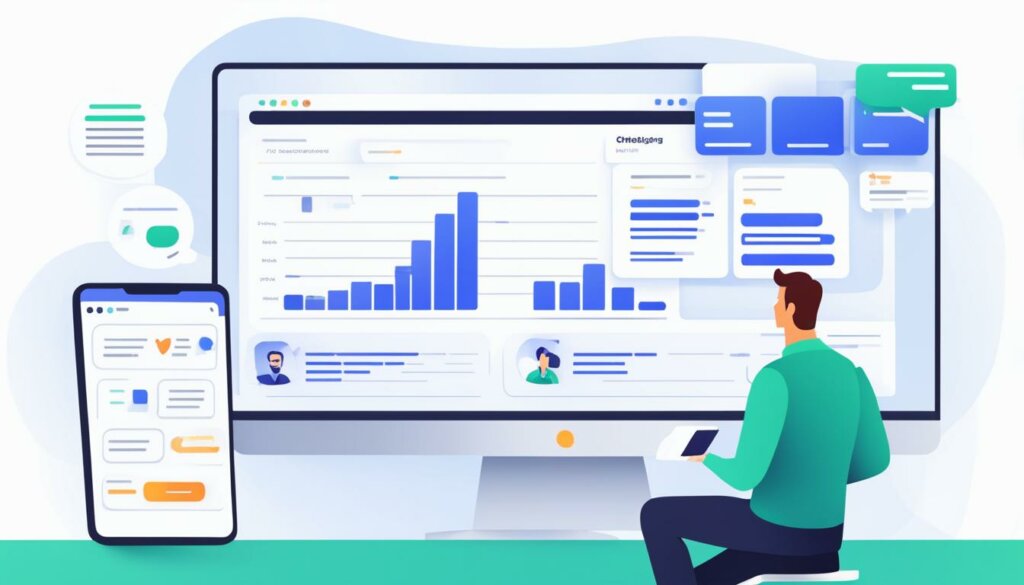Table of Contents
Welcome to our comprehensive guide on leveraging ChatGPT for ecommerce success. In today’s AI-powered ecommerce landscape, businesses are constantly seeking innovative solutions to enhance customer experiences and drive growth. ChatGPT, developed by OpenAI, is an advanced AI language-processing tool that has the potential to revolutionize various aspects of ecommerce operations.
By leveraging ChatGPT, ecommerce businesses can unlock a plethora of benefits, ranging from enhanced customer service to personalized recommendations, improved sales and marketing strategies, data-driven insights, and automation of operational processes. However, it is crucial to understand both the capabilities and limitations of ChatGPT to ensure its effective implementation.
In this article, we will explore how to use ChatGPT for ecommerce and discuss the crucial factors to consider when leveraging this AI-powered tool. From understanding ChatGPT to the benefits it offers, as well as the limitations and best practices, we will provide you with valuable insights to optimize your ecommerce strategies and achieve success.
Let’s dive in and discover how leveraging ChatGPT can elevate your ecommerce business to new heights!
Understanding ChatGPT
ChatGPT, developed by OpenAI, is a sophisticated language-processing AI that can generate remarkably human-like text. The latest version, GPT-4, offers improved understanding and response capabilities, making it ideal for customer-centric applications such as customer service and sales. This AI model utilizes deep learning techniques and a transformer architecture to process input messages and generate contextually appropriate replies.
Deep Learning and Transformer Architecture
GPT-4 harnesses the power of deep learning, a subfield of machine learning that enables the AI model to learn patterns and representations from vast amounts of data. By utilizing deep neural networks with multiple layers, the model can extract complex features and make informed predictions based on the input it receives.
Moreover, GPT-4 adopts a transformer architecture, which allows the model to process and generate text in a more efficient and context-aware manner. The transformer architecture utilizes attention mechanisms, enabling the model to focus on relevant parts of the input and generate coherent and relevant responses.
“GPT-4’s improved understanding and response capabilities make it an invaluable tool for customer-centric applications in ecommerce.”
Enhancing Customer Experiences
ChatGPT, with its advanced language-processing capabilities, can play a crucial role in enhancing customer experiences in various customer-centric applications. It enables businesses to provide prompt and accurate responses, personalized recommendations, and a seamless conversational experience to their customers.
GPT-4 for Customer Service
When it comes to customer service, GPT-4 can handle a wide range of inquiries and provide timely assistance. It can address common queries, provide product information, assist with troubleshooting, and handle simple customer complaints. By automating these interactions, businesses can reduce response times and free up resources to focus on more complex customer issues.
GPT-4 for Sales
In sales applications, GPT-4 can contribute to lead generation, guiding customers through the sales funnel, and offering relevant product recommendations. Its ability to understand customer preferences and generate persuasive content can significantly enhance the sales process and drive conversion rates.
| Customer-Centric Applications | Benefits of GPT-4 |
|---|---|
| Customer Service | Prompt and accurate responses |
| Sales | Lead generation and personalized recommendations |
| Ecommerce Support | Improved customer experiences and increased conversions |
Benefits of ChatGPT for Ecommerce
ChatGPT offers several powerful benefits for ecommerce businesses. Let’s explore how leveraging ChatGPT can enhance customer service, provide personalized recommendations, optimize sales and marketing efforts, deliver valuable analytics and insights, and automate operational processes.
Enhanced Customer Service
One of the key advantages of ChatGPT is its ability to enhance customer service. With ChatGPT, businesses can provide 24/7 support, reducing waiting times and ensuring timely responses to customer queries. This not only improves customer satisfaction but also allows human representatives to focus on complex queries that require a human touch.
Personalized Recommendations
ChatGPT utilizes customer data to generate personalized recommendations, transforming the shopping experience. By analyzing customer preferences and purchase history, ChatGPT can suggest relevant products and services, increasing the likelihood of successful conversions. This personalized approach enhances customer engagement and drives sales.
Sales and Marketing Optimization
When it comes to sales and marketing, ChatGPT can play a crucial role. It can generate leads by engaging potential customers in meaningful conversations and guiding them through the buyer’s journey. ChatGPT can also provide targeted messaging, ensuring that customers receive relevant offers and promotions. By leveraging ChatGPT, businesses can optimize their sales and marketing strategies for maximum effectiveness.
Analytics and Insights
By analyzing customer data, ChatGPT offers valuable analytics and insights that can greatly benefit ecommerce businesses. These insights provide a deeper understanding of customer preferences, purchasing patterns, and browsing behavior. With access to such data, businesses can make informed decisions, improve product offerings, and enhance security measures to protect customer information.
Automation of Operational Processes
ChatGPT automates operational processes, saving time and resources for ecommerce businesses. It can handle routine tasks such as order tracking, providing shipping information, and answering frequently asked questions. By automating these processes, businesses can streamline their operations, improve efficiency, and free up human resources for more complex and strategic tasks.
With its customer service enhancement, personalized recommendations, sales and marketing optimization, analytics and insights, and automation of operational processes, ChatGPT proves to be a valuable tool for ecommerce businesses.

Stay tuned for the next section, where we will delve into the limitations of ChatGPT when compared to human capabilities in ecommerce settings.
What ChatGPT Can’t Do as Well as Humans
While ChatGPT is powerful, it has limitations when compared to humans. It may struggle with complex customer service scenarios, lack emotional intelligence, underperform in negotiation situations, and fall short in creative work, decision-making in ambiguity, understanding cultural context, and establishing genuine human connections.
- Complex customer service scenarios: ChatGPT may have difficulty addressing intricate customer queries or resolving complex issues that require nuanced human judgment and expertise.
- Emotional intelligence: Understanding and responding empathetically to customers’ emotions and moods is a challenge for ChatGPT, as it lacks the contextual and intuitive understanding that humans possess.
- Negotiation in chat: ChatGPT may struggle with negotiation scenarios, especially when it comes to finding mutually beneficial solutions or reaching compromises.
- Creative work: While ChatGPT can generate text, it may not possess the imaginative and artistic qualities that are integral to tasks such as content creation, design, or creative problem-solving.
- Decision-making in ambiguity: ChatGPT’s ability to make decisions or provide accurate responses in ambiguous situations may be limited, as it relies on explicit instructions and predefined patterns.
- Understanding cultural context: ChatGPT may lack the cultural knowledge and sensitivity required to effectively communicate with diverse audiences or navigate cultural nuances.
- Genuine human connections: Despite its language proficiency, ChatGPT may struggle to establish the same level of connection, rapport, and trust that humans can build with customers through authentic interactions.
Human involvement remains crucial in these areas, ensuring the best possible outcomes for complex customer interactions, emotionally charged scenarios, negotiation processes, creative endeavors, decision-making in ambiguous contexts, cross-cultural engagements, and building genuine connections with customers.
ChatGPT for Ecommerce: Best Practices
To maximize the potential of ChatGPT in ecommerce, follow these best practices:
- Engaging Product Descriptions: Use ChatGPT to generate captivating product descriptions that highlight the unique selling points of your offerings. Engage your customers with compelling language that showcases the benefits and features of your products.
- Email Templates: Leverage ChatGPT to streamline your customer service by creating email templates. Use AI-generated responses to efficiently handle common customer queries and provide timely assistance.
- Social Media Campaigns: Harness the capabilities of ChatGPT to create compelling social media campaigns. Craft attention-grabbing captions and posts that resonate with your target audience, encouraging interaction and generating sales leads.
- Landing Page Copy: Utilize ChatGPT’s capabilities to craft persuasive landing page copy. Use AI-generated text to optimize landing pages for better conversion rates, captivating visitors and compelling them to take action.
- Audience Demographics: Leverage ChatGPT to analyze audience demographics. Gain valuable insights into your customer base, allowing you to tailor your product offerings and marketing strategies to better meet their needs.
- Content Marketing: Utilize ChatGPT to optimize your content marketing strategies. Generate AI-driven content ideas, blog posts, and articles that engage your target audience, position your brand as an industry leader, and drive organic traffic to your website.
- Paid Ads Copy: Utilize ChatGPT for generating appealing copy for your paid advertisements. Craft attention-grabbing ad text that entices potential customers, increasing click-through rates and driving conversions.
- Customer Service: Use ChatGPT to enhance your customer service. By integrating AI-powered chatbots, you can provide quick and accurate responses to customer inquiries, improving satisfaction and boosting sales.
By implementing these best practices, you can optimize the use of ChatGPT in your ecommerce business, resulting in engaging product descriptions, streamlined customer service, compelling social media campaigns, persuasive landing page copy, data-driven audience insights, effective content marketing, and appealing paid ads copy. Understanding and meeting customer expectations are key to achieving ecommerce success.
Getting Started with ChatGPT
To get started with ChatGPT, creating an account on the ChatGPT website is the first step. This allows you to access all the features and functionalities that ChatGPT offers for your ecommerce business.
When interacting with ChatGPT, providing detailed context is crucial to generate the best responses. Describe the specific situation or query clearly, ensuring that the AI model understands the context accurately.
Setting the right tone is also important when using ChatGPT. Specify the desired vibe or tone you want the responses to reflect. This helps in aligning the AI-generated text with your brand’s personality and communication style.
If the initial output from ChatGPT isn’t satisfactory, don’t worry. You can refine the prompts to guide the AI model in generating better responses. Experiment with different phrasing or add more specific instructions to improve the quality and relevance of the generated text.
By following these steps and understanding how to effectively engage with ChatGPT, you can unlock its full potential in your ecommerce business. Whether it’s enhancing customer interactions, streamlining operations, or gaining valuable insights, ChatGPT can be a powerful tool in driving success.
With the right approach and utilization of ChatGPT, you can elevate your ecommerce business to new heights.
Cautions When Using ChatGPT for Ecommerce
While leveraging ChatGPT for ecommerce can bring numerous benefits, it’s important to exercise caution in its implementation.
- Impact on Google Ranking: Publishing ChatGPT-generated content without proper editing or optimization can negatively affect your website’s Google ranking. It’s crucial to review and refine the text to ensure it aligns with SEO best practices.
- Repetitive Information: ChatGPT might produce repetitive information as it relies on learned patterns. To maintain engaging and fresh content, it is essential to review the responses and avoid redundancy.
- Limitations of Accuracy: While ChatGPT produces impressive results, its accuracy may vary. It’s vital to review and verify the generated content to ensure it aligns with your brand’s messaging and accuracy requirements.
- Potential Bias: AI models like ChatGPT may inherit biases present in the training data. It’s crucial to monitor and mitigate potential biases to prevent unintentional discrimination or unfair treatment of users.
- User Guidance and Oversight: ChatGPT should be used under proper user guidance and oversight. Human supervisors should provide regular input, review outputs, and maintain quality control to ensure a positive user experience and accurate results.
Addressing these cautions is imperative for the responsible and effective use of ChatGPT in ecommerce scenarios. By understanding the potential challenges and implementing appropriate measures, you can harness the power of ChatGPT while mitigating any potential drawbacks.
Conclusion
Leveraging ChatGPT for ecommerce success requires a comprehensive understanding of its capabilities, benefits, and limitations. By harnessing its power for customer service enhancement, personalized recommendations, sales and marketing, analytics and insights, and automation of operational processes, ecommerce businesses can deliver exceptional customer experiences and gain a strategic edge over competitors. However, it is imperative to acknowledge that human involvement still outperforms AI in certain areas.
To ensure optimal results, it is essential for ecommerce businesses to follow best practices when using ChatGPT. By creating engaging product descriptions, streamlining customer service with AI-generated email templates, crafting compelling social media campaigns, and leveraging persuasive landing page copy, businesses can maximize the impact of ChatGPT in their marketing efforts. Additionally, understanding audience demographics, optimizing content marketing strategies, and generating appealing paid ads copy are key strategies for success.
For a successful ChatGPT implementation, getting started by creating an account on the ChatGPT website is the first step. Providing detailed context and specifying the desired tone of communication further enhance the accuracy and relevance of the AI-generated responses. If initial outputs are not satisfactory, refine prompts to achieve the desired outcomes. However, it is crucial to exercise caution when utilizing ChatGPT by considering potential limitations, such as Google ranking impacts, repetitive information, accuracy variations, potential bias, and the need for user guidance and oversight to maintain quality.
In conclusion, by understanding the capabilities and limitations of ChatGPT, adhering to best practices, getting started on the right foot, and being aware of potential cautions, ecommerce businesses can effectively leverage this powerful AI tool to achieve their desired success. ChatGPT has the potential to transform customer experiences, drive sales, enhance marketing strategies, and streamline operational processes, ultimately leading to ecommerce success.
FAQ
How can ChatGPT be leveraged for ecommerce success?
ChatGPT can be utilized for customer service enhancement, personalized recommendations, sales and marketing, analytics and insights, and automation of operational processes to drive ecommerce success.
What is ChatGPT and what is GPT-4?
ChatGPT is an advanced AI language-processing tool developed by OpenAI. GPT-4 is the latest version of ChatGPT, offering improved understanding and response capabilities.
What are the benefits of using ChatGPT for ecommerce?
ChatGPT enhances customer service, provides personalized recommendations, improves sales and marketing, offers data-driven insights, and automates operational processes for ecommerce businesses.
What are the limitations of ChatGPT compared to humans?
ChatGPT may struggle with complex customer service scenarios, lack emotional intelligence, underperform in negotiation situations, struggle in creative work, face challenges in decision-making with ambiguity, have limited understanding of cultural context, and fail to establish genuine human connections.
What are the best practices for using ChatGPT in ecommerce?
Best practices include utilizing ChatGPT for engaging product descriptions, streamlining customer service with email templates, creating compelling social media campaigns, crafting persuasive landing page copy, analyzing audience demographics, optimizing content marketing strategies, and generating appealing paid ads copy.
How can I get started with ChatGPT?
To get started with ChatGPT, create an account on the ChatGPT website. When interacting with ChatGPT, provide detailed context to generate the best responses, set the right tone, and refine prompts if the initial output isn’t satisfactory.
What precautions should be taken when using ChatGPT for ecommerce?
It’s important to edit and optimize ChatGPT-generated content before publishing to avoid impacting Google ranking. Repetitive information may result from learned patterns, so accuracy should be reviewed and verified. Potential bias should be monitored and mitigated, and user guidance and oversight are crucial for maintaining quality.
How can ChatGPT be leveraged for ecommerce success?
By understanding the capabilities, benefits, and limitations of ChatGPT and following best practices, ecommerce businesses can effectively leverage ChatGPT for superior customer experiences and gain a competitive advantage.













